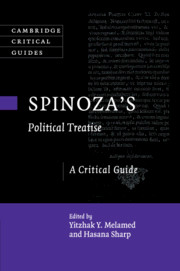Book contents
- Spinoza’s Political Treatise
- Cambridge Critical Guides
- Spinoza’s Political Treatise
- Copyright page
- Dedication
- Contents
- Contributors
- Acknowledgments
- Abbreviations
- Introduction
- Chapter 1 What Is Real about “Ideal Constitutions”?
- Chapter 2 Statesmen versus Philosophers
- Chapter 3 The Condition of Human Nature
- Chapter 4 Politically Mediated Affects
- Chapter 5 Longing (desiderium) for Vengeance as the Foundation of the Commonwealth*
- Chapter 6 Family Quarrels and Mental Harmony
- Chapter 7 Spinoza on National Religion
- Chapter 8 Religion and the Civil State in the Tractatus Politicus
- Chapter 9 Spinoza on Aristocratic and Democratic Government
- Chapter 10 When Having Too Much Power Is Harmful
- Chapter 11 Spinoza and Political Absolutism
- Chapter 12 The Revolutionary Foundation of Political Modernity
- Bibliography
- Index
- Cambridge Critical Guides
Chapter 3 - The Condition of Human Nature
Spinoza’s Account of the Ground of Human Action in the Tractatus Politicus
Published online by Cambridge University Press: 19 July 2018
- Spinoza’s Political Treatise
- Cambridge Critical Guides
- Spinoza’s Political Treatise
- Copyright page
- Dedication
- Contents
- Contributors
- Acknowledgments
- Abbreviations
- Introduction
- Chapter 1 What Is Real about “Ideal Constitutions”?
- Chapter 2 Statesmen versus Philosophers
- Chapter 3 The Condition of Human Nature
- Chapter 4 Politically Mediated Affects
- Chapter 5 Longing (desiderium) for Vengeance as the Foundation of the Commonwealth*
- Chapter 6 Family Quarrels and Mental Harmony
- Chapter 7 Spinoza on National Religion
- Chapter 8 Religion and the Civil State in the Tractatus Politicus
- Chapter 9 Spinoza on Aristocratic and Democratic Government
- Chapter 10 When Having Too Much Power Is Harmful
- Chapter 11 Spinoza and Political Absolutism
- Chapter 12 The Revolutionary Foundation of Political Modernity
- Bibliography
- Index
- Cambridge Critical Guides
Summary
- Type
- Chapter
- Information
- Spinoza's Political TreatiseA Critical Guide, pp. 47 - 60Publisher: Cambridge University PressPrint publication year: 2018
- 2
- Cited by

